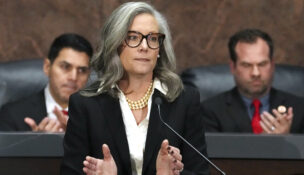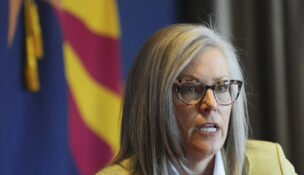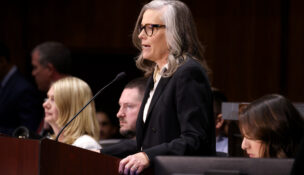Hobbs folds, agrees to send nominees to Senate for confirmation
Howard Fischer, Capitol Media Services//August 12, 2024//
Hobbs folds, agrees to send nominees to Senate for confirmation
Howard Fischer, Capitol Media Services//August 12, 2024//
Gov. Katie Hobbs has given up on her bid to force the Senate to confirm her nominees to head state agencies.
In an agreement filed with Maricopa County Superior Court late Monday, Hobbs agreed to again start sending names of her choices to the Senate, if not immediately at least when the session begins in January. And once she does that, they can serve for up to a year without Senate action.
But nothing in the deal actually forces the Senate to provide her picks with any better treatment than many of them got last year. And it was that treatment, which Hobbs called “disrespectful,” that led her to withdraw the names and instead use a procedure to set them up to keep running the agencies without Senate approval.
That would have continued except for the fact that Senate President Warren Petersen sued the governor. And Judge Scott Blaney, an appointee of former Gov. Doug Ducey, ruled in June that the Hobbs had acted illegally.
At that time, the judge didn’t order her to do anything. Instead, he agreed to give Hobbs a chance to work things out with the Senate.
Blaney made it clear, however, that if the two sides did not have something in place by Wednesday he would use his powers to force compliance. And that could have resulted in Hobbs being ordered to comply.
This new deal saves Hobbs the embarrassment of such an order.
Monday’s agreement is a key victory for Petersen, a Gilbert Republican. If nothing else, it keeps in place Blaney’s original order that Hobbs was acting illegally.
Potentially more significant, nothing in the order requires there be any change in how the special Director Nominations Committee created by Petersen handles each of the governor’s picks. And there is nothing in the order addressing Hobbs’ contention that Sen. Jake Hoffman, R-Gilbert, who chairs that panel, was acting improperly in the questions he was asking her nominees.
About the only thing Hobbs may have gotten is she will not be asked to pay the legal fees for the Senate.
There was no immediate comment from the governor about the deal.
But Petersen, in a prepared statement, said the agreement amounted to Hobbs admitting she broke the law. And he said it preserves the confirmation process and the check it serves on gubernatorial powers and stops her efforts “to force unlawful and extreme agendas on our citizens.”
“I look forward to reinstating the confirmation process so that we can properly vet director nominations in an effort to ensure only the most qualified candidates are serving in these critical roles,” Petersen said.
The fight stems from the decision of Petersen to create that special committee to give gubernatorial nominees more than what he said had been a cursory review.
A few were confirmed and some were rejected.
But that still left 13 by September who were in a governmental limbo.
They would have been allowed to serve as directors for up to a year. But if they were not confirmed in that time, the governor would have to name someone else.
Hobbs, rather than waiting, then withdrew those 13 names.
More legally problematic, according to Blaney, is that she then used a maneuver to have each of them named “executive deputy directors” of the same agencies. And given there was no director, that left each of them back in charge despite the fact they had not been confirmed by the Senate as required by state law.
Hobbs said that maneuver was the only way to ensure there was someone of her choosing in charge at each agency and that they continued to function.
Blaney, however, was unimpressed.
“The governor … took those actions for an improper purpose, culminating in improper results – one that violates Arizona law,” he wrote.
Blaney also took a slap at Hobbs for arguing that state law allows her to appoint deputy directors, even without directors over them who are subject to Senate confirmation. He said under Arizona law, the people who run state agencies are subject to Senate confirmation, regardless of what they are called.
“That process requires oversight by the legislative branch,” Blaney said. “Here, the governor willfully circumvented that statutory process and eliminated the legislative branch from its executive role.”
And the judge said if he were to agree with her arguments it would “render meaningless” a host of other state laws dealing with state agencies.
A bid by Hobbs for intervention by the state Court of Appeals was rebuffed. That left Hobbs to either work something out with Petersen before Wednesday or face a court order from Blaney.
The judge did not dispute the governor’s contention that Hoffman and the Senate had tied up the confirmation process and left her picks – and the agencies they head – in a legal limbo. But that, he said, carries no legal water.
“The governor’s frustration with a co-equal branch of government – even if that frustration was justified – did not exempt her director nominees from Senate oversight,” he wrote.
Petersen called the governor’s effort “an attempt to force unlawful and extreme agendas on our citizens.”
“No elected official is above the law,” he said. “And the governor’s manipulative scheme to circumvent Senate confirmation demonstrates the crucial role the Legislature serves in holding the executive accountable against abuses of power.”














































